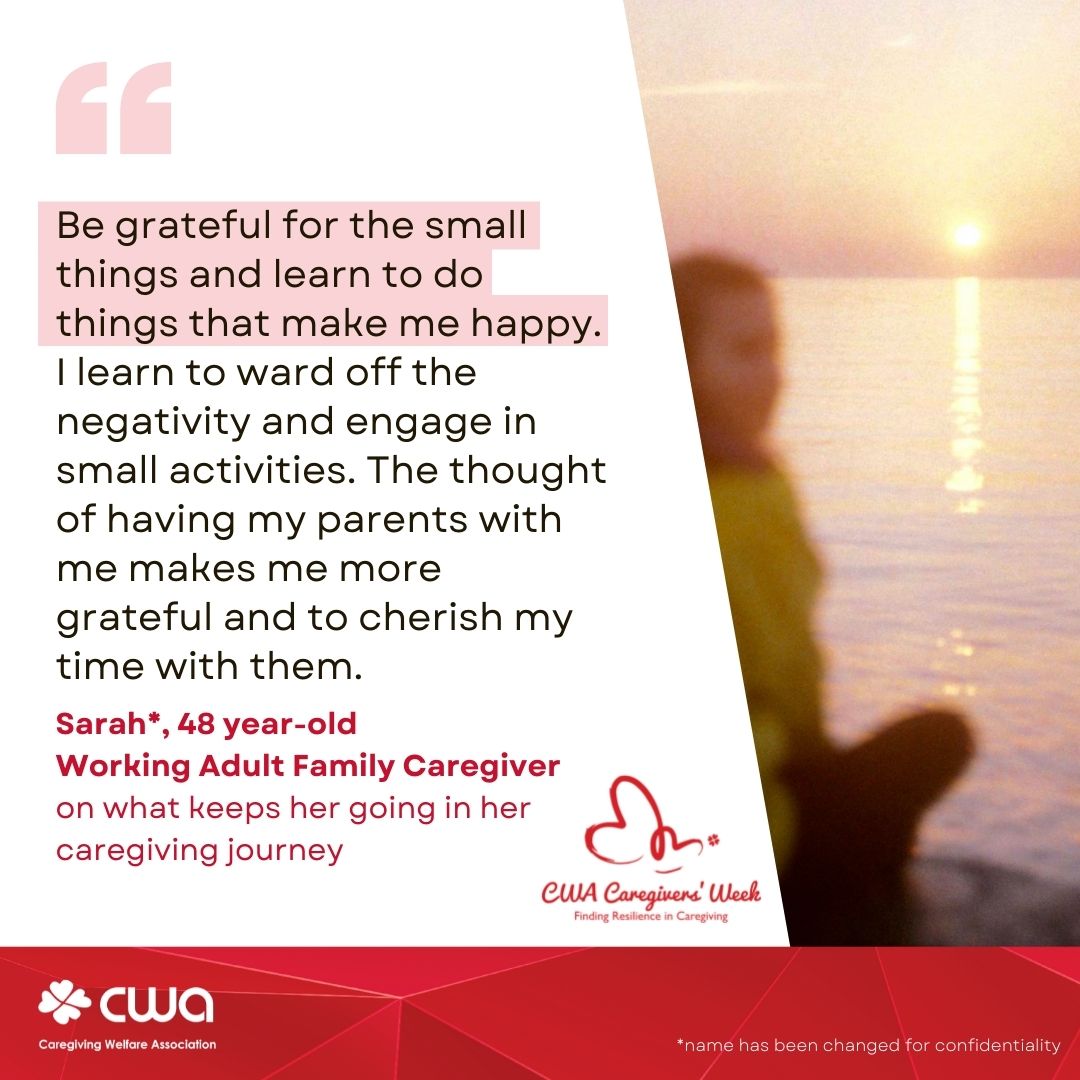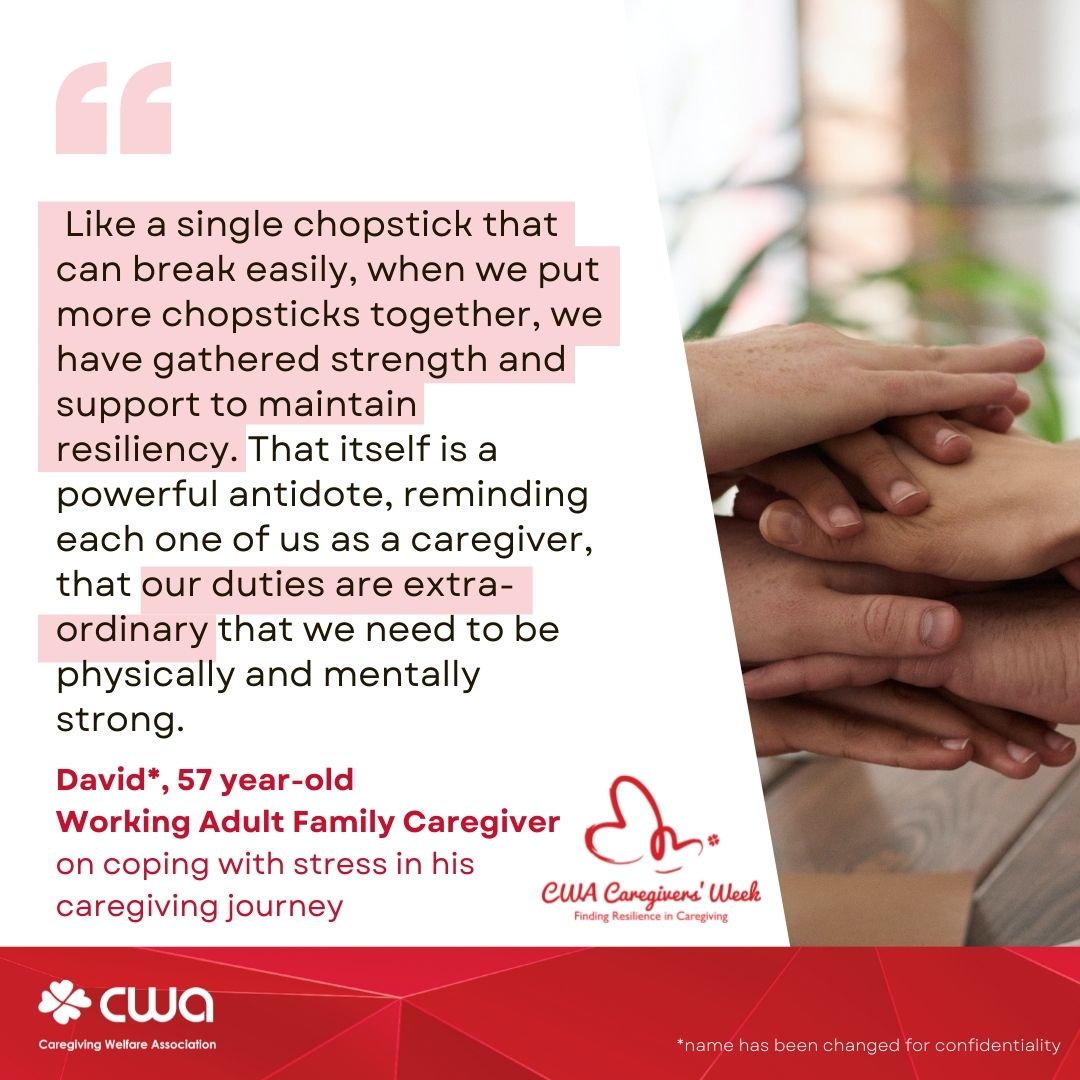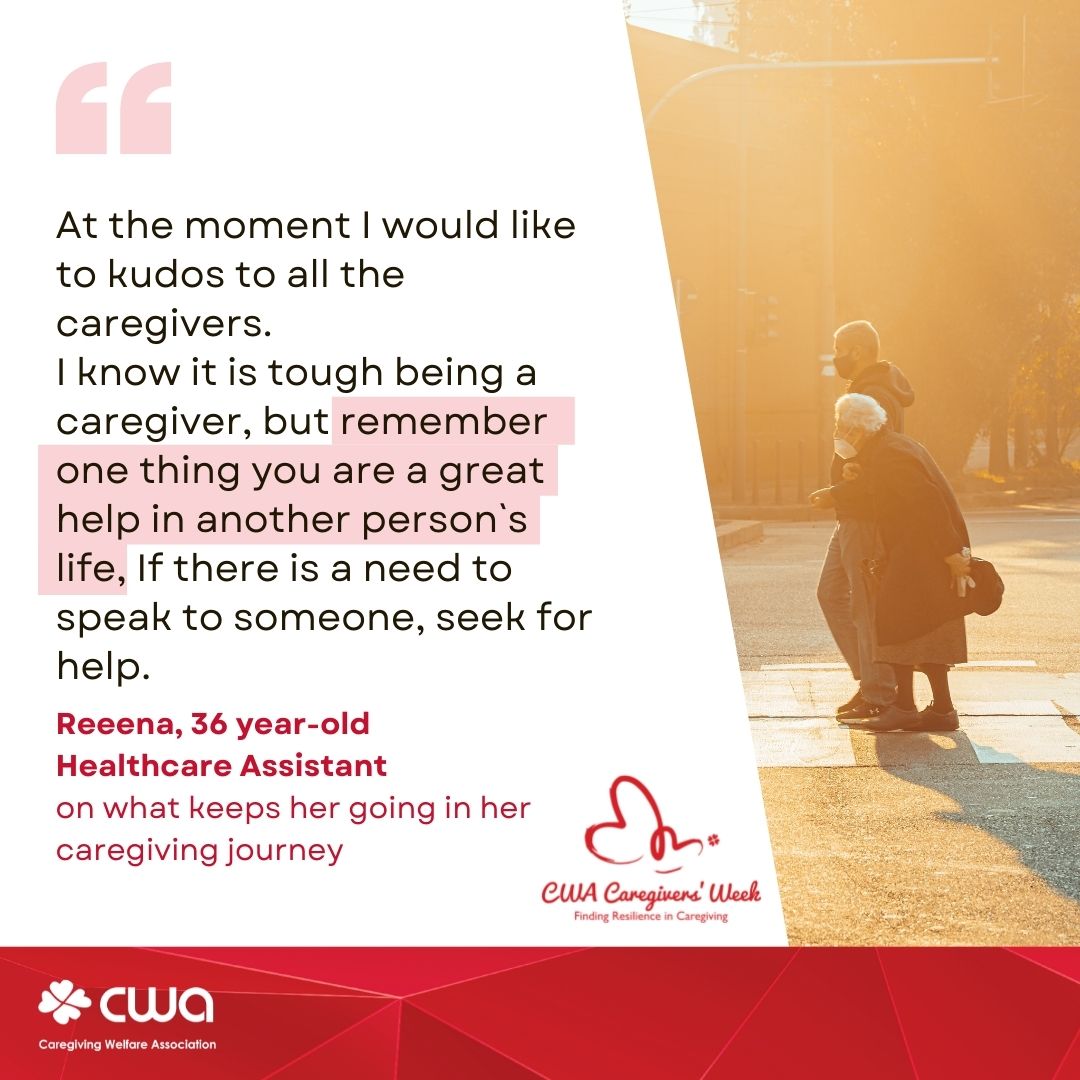
|
|
|
Finding Resilience in Caregiving
Being Grateful and Staying Positive

Sarah* is a 48 year old working adult living with her parents. Both parents are in their 60s and 70s, having suffered stroke, diabetes, high blood pressure and other health complications.
*name has been changed for confidentiality
A day in the life of a caregiver
Sarah:
.png)
Start the day with showering parents in the morning. While waiting for breakfast to be ready, assist parents in simple exercises like standing, walking and squeezing physio ball for hands workout. On certain day in a week, bring parents out for morning stroll with helper. After breakfast, bring parents to washroom for nap time.
After nap time, change dad diapers and bring mom to toilet. Parents spend time watching TV or do simple activities like reading and colouring. Get ready for lunch. After resting, prepare parents for afternoon nap. Change dad diapers and helper showers mom after nap time.
Watch TV and prepare dinner at 6pm. Bring mom to the toilet. Parents spend time watching TV and do simple exercises at home. Engage parents in reading and cognitive exercise like flashcards and other learning. Change dad diapers and prepare parents for bed.
I support in walking, transferring, toileting, dressing, supervised eating especially for mom, give medication and follow up medical appointments. Follow up on parents’ massage on weekly basis. Have trained helper to perform simple massages. Monitor parents’ health like foot care to ensure nails are cut and wounds or tears to be treated.
Look out for care resources and learn online how to handle parents’ conditions. Chat with parents and spend time with them. Also cook their favourite meals and ensure to bring them out nearby once in a while together with the helper.
Have a helper who is picking up very well. Other family members provide monetary and logistics support. Physical care of parents is mainly me and helper. When at work or need time off from caregiving, I can rely on helper to handle parents alone as she manages to pick up very well. Discuss and inform siblings to help keep a look out on parents if I go for staycay or vacation in near future.

The Journey of Caregiving
Sarah:
.png)
Been handling mom nearly 20 years. Still single and live with parents. Caregiver by default.
In 2019, I had to juggle parents, home, helper and work challenges all at one time. Parents been in and out hospital from March till October. They suffered more health complications more than just diabetes and high blood. I have to accept the fact they are ailing and caring for them is to reduce the rate of degeneration of their illness. This meant having a helper as parents need full time care. Other challenges include sourcing for helper before dad got discharged, coordinating training and home logistics and had to adjust having a helper at home. At work, a new colleague just joined and had to perform OJT on top of workload. Simultaneously, getting calls from hospitals, coordinating hospital visits and managing home and helper issues. It affected me emotionally knowing I had to be strong despite the challenges.
The most heart-warming experience that struck me till this day is when mom steadily held my hand, looked at me and slowly said “Thank you for caring and showering me.” This moment is priceless!

Finding Resilience in Caregiving
Sarah:
.png)
Would love to be a carefree single with no ‘strings attached’ Looking at friends who easily go on holidays affects me. During this pandemic, I am more careful in going out like limiting to adhoc weeknight and short outings. At times, it does frustrate me that I am not free to go many places and staycay.
Be grateful for the small things and learn to do things that make me happy.
I learn to ward off the negativity and engage in small activities. The thought of having my parents with me makes me more grateful and to cherish my time with them.
Faith and positive mindset. Learn to let go and love yourself more. Set aside ‘me time’ to pick up a hobby, have short outings or challenge myself to learn new things. Learn to seek help.
I have received help from CWA for home personal care for dad. It does help to reduce my helper burden on caring for 2 elderly. Especially when one gets more ailing and physical to handle alone. CWA caregiving session does help to foster interactions and get to know other caregivers who are facing difficulties in their journey too.

A word for Caregivers
Sarah:
.png)
Do things that make you happy!

Quotations cited are original, unedited texts from the source.)
Life is a Balance of Holding On and Letting Go

David* is a 57 years old yoga teacher teaching seniors in a yoga centre two days a week while caring for his 88 years old mother who has an advanced stage of dementia and immobile.
In end 2017, He quit his full-time job in an IT company where he had worked for about 20 years to provide care to his elder sister who is having end-stage pancreatic cancer. His mother then had started to show some mild symptoms of dementia, but then they did not take notice because his focus was on his sister’s illness. In early 2019, his mother had shown obvious memory lost, and that was when the doctor diagnosed her to have a middle-to advance stage of dementia. In the same year, his elder sister had also succumbed to the disease and passed on. Few months later, his mother had a fall in the toilet when she woke up at night trying to relief herself. The fall had caused fracture of her hip bone and injury to her head. Because of her advance in age and bone condition, the doctor advised against performing a corrective surgery. From then on, she has been bed and wheelchair bound.
*name has been changed for confidentiality
A day in the life of a caregiver
David:
.png)
Currently my mother health condition is considered stable, and I visit her once or twice weekly. There is a period of time when her conditions is not good and I am with her almost every day or every other day attending to her. My usual routine will be talking to her, checking to make sure she does not develop any visible symptoms of injury or feeling unwell, constipation, or no appetite of taking her meals, massage her hands and legs, monitoring her dementia progress etc. Sometime if any of the equipment (such as wheelchair or commode or toilet bar etc) faulty, I will either repair myself or contact and arrange for repair man to come over to repair or replace them. I am also contacting and arranging for ambulance to bring her to see doctor whenever there is ad-hoc or regular medical review appointment. I am also taking care of sourcing and buying items that are necessary to support her daily needs.
We have hired a domestic helper to look after my mother full-time, in helping with daily chores such as to wash and change her, change her diaper, cooking for her etc. My role is mainly to provide care of sending her to hospital for regular doctor review and ad-hoc situation, get TCM doctor to come over to her place for treatment, talking to her, massage her, getting her involve in simple activities. Before covid become serious, I will bring her down to Brahm Macpherson centre located near to my mother’s place for her to participate in some workout and gathering. But for the last 12 months or more, she has been confined sort of at home. Now she has also developed into advance stage of dementia, most of the time she cannot recognize who we are and keep repeating a few words and dwell in her own world. In summary, the domestic helper is responsible for looking after her physically while I am sort of doing all the others to support her.
My elder brother and the domestic helper currently are staying with my mother. My second sister has helped to care for my mother whenever the domestic helper go for her day off. I am the primary caregiver in the sense that I am the main contact point if there is anything happened to my mother, including sourcing of equipment and installations needed to support her daily living. The hospital has also registered me as a primary contact whenever my mother warded.

The Journey of Caregiving
David:
.png)
Becoming a caregiver came naturally in a way. Initially I was caring for my elder sister because of her sickness and progressively after she passed on, I am now caring for my mother. I volunteer myself amongst my siblings because someone has to do the job and I consider myself more “independent and eligible” while other of my siblings have family and career to focus on at this moment.
In my opinion, though caregiving needs a lot of physical time and also money spent, the real challenges are more coming from emotional management than physical rendering of help. The kind of emotion management from recognizing to acceptance of our loved one changing from one dimension to another totally different dimension, such as for my elder sister, from one healthy individual to become very sick, total change of look, complete change of lifestyle, losing so much weight that left only with bones, and also for my mother from a rationale person develop to become someone so different beyond “recognition”, having quick tempered and drastic mood swing behaving like a total different person. Myself and my siblings have to make a lot of mental adjustments to come to term, the state of realization and finally accept the present conditions, to move on with our lives while caring for our loved one.
I remembered the very first time, when mother cannot recognize me as her son and instead calling me as an outsider. That is the time when my heart really broken. I cannot remember I have tear moving around or drop from my eyes at that moment.
One of the challenges that I faced with my mother was there was a period, I cannot remember exactly how many months it lasted, she develops a habit of playing with foods in front of her. Whenever come to mealtime when foods are served in front of her, she will use her hands to play with the foods by touching and/ or holding the foods in her palm and throw the foods around. Quite frequent it includes the bowl and plates and cup as well, virtually everything placed in front of her. It is a real difficult task to coerce her to take her meal, depending on her mood at that time. I and the domestic helper have to be very patient to coerce her to take her meal, at time when her mood is really lousy, may have to skip the meal and take at much later time when she is having better mood or may be when she is feeling really hungry. Most of the time, she is very agitated and shouted at everyone, scolding vulgar language, grab anything within her reach and throw anywhere. Fortunately, now she has “overcome” that stage, though she lost more and more memory and at time also get very agitated but at least she does not throw her foods around anymore.
There are other challenges that I am facing with my own family members and friends when I have quit my full-time job. It took me and my family almost 2 years to come to term that I do not have a job, though my children are all above 21 years of age and my wife is holding a part-time job. There are invisible pressure building and mounting during that period on financial survivability at old age and whether I may develop early dementia since I am jobless before the official retirement age.
There are a lot of internal emotional struggle that I must go through for without a job and also caring for my elder sister and mother.
Despite the challenges, there are heart-warming moments as well. Through chances, I have come to know about CWA and enrol in their caregiver support group activities, and that is where I have come to know the caring CWA staffs and a group of caregivers, each one of them have their own unique story of life experiences to tell. We shared our moments and life perspectives during the organized activities. This has given me a lot of mental stress relief, and I believe it apply to others too.
I remembered one of the activities was to place everyone hands on a piece of rectangular-shaped paper, and we are supposed to draw the outline following the contour of our fingers. Subsequently we were told to colour each of the fingers inclusive of borders outside with the colour of our preference. To my surprise at the end of the session, the picture turned out to be amazingly astonishing and to-date I believe that picture is still hanging in CWA office. At that moment, I felt a sense of warmness in my heart when I looked at the completed artwork, I am amaze by how each one of our hands, when place together, can create such a magical piece of art. It strikes me at that instance that isn’t life the same. When we shared our moments and experiences and getting helps from others is better than we do the same thing single handed? The artwork also is a great reminder to me that everyone of us is capable to shape and colour our own life, and life will be more beautiful if we are able to shape, stand together and share our life experiences with more people. I truly find peace and harmony after the sharing session. I have now built trust and learned to accept that the domestic helper can be my very useful pairs of hands and legs so I am physically and mentally much more at ease compared to before, and that I can focus in leading and shaping my own life while still caring for my mother, instead of pouring every bit of my energy in managing the forever challenging situations, that may arise any moment in any form.
And sometimes, out of the blue, my mother can recall who I am, calling out my exact name, talking to me as if like not having dementia, even though in a very short and rare moment, it gives warmness to my heart.

Finding Resilience in Caregiving
David:
.png)
During the first 2 years, at some intervals when I reflect, it does give me a feeling of lost, questioning my decision to quit my job to care for my sister and mother. The question always coming up is “Why me?” Most people may feel that hiring a full-time domestic helper will be good enough or may be enrol their parents into a nursing home, looking after by professionals may be a better alternative. At time, I do feel tired and feel that my body need a good rest.
However, after I have joined the CWA caregiver support group, through multiple sharing sessions, I realized there are people out there facing more challenging situations than I am. I have given them my admiration and at the same time they have given me the required strength and aspiration, pushing me forward to carry on with my duties and live my life. I have realized there are so many things that we can learn from these caregivers, their wisdom, the ways they handle their life situations, never stop finding solutions to solve their problems and live their life with positive attitude and perspective.
Stress in work and in caregiving are quite a different learning experience. I am fortunate to have found a capable domestic helper who have a heart and patience to care for elderly, despite I have learned from some previous bad experiences, changed a few helpers before I came to hire the current helper.
CWA has given me a torch to shine my way in the dark journey of caregiving by providing opportunities for caregivers like myself to interact and provide support to each other. Like a single chopstick that can break easily, when we put more chopsticks together, we have gathered strength and support to maintain resiliency. That itself is a powerful antidote, reminding each one of us as a caregiver, that our duties are extra-ordinary that we need to be physically and mentally strong. Strong is not enough, having a healthy life perspective and outlook is one of the most important elements that can keep any caregiver moving forward, by exercising self-care first, placing self before others in the caregiving journey. Only when one can look after himself or herself adequately, then he or she is able to render help to others. This takes a lot of awareness and self-awakening. I would say that CWA has provided informative sessions through support group activities, yearly forum etc to equip us the needed knowledge and most importantly change and divert our mental perspective away from dwelling in problems and instead looking for help and a solution.
From my own encounter, so far CWA and Brahm centre are the most active in following up with me, and I do not really receive any assistance from other government agencies, other than I think there is a special grant from AIC for my immobile mother. I must also mention that owing to AIC partnering with SGH, that I have come to know about and contact CWA.

A word for Caregivers
David:
.png)
Though different caregivers may be facing different kind of caregiving situations, be it financially, physical care or mental health, I hope the following may be useful and handy for them:
1. Recognise and accept there is change
Recognize and accept their unique situations. Knowing there are solutions and helps out there and that they are not alone is an important first step. This create a sense of awareness and being mindful of who they are and what they do. This also help to set right expectation.
2. Reaching out
Have an open-mind, willingness to reach out to seek help by contacting relevant government agencies or related organizations, such as CWA. Find out what kind of helps are available, and which one is relevant to their situation.
3. Willingness to accept help
They must realize helps are needed from others for them to overcome the existing challenges instead of shouldering everything on their own. Willingness to accept helps from external parties is one big important step towards liberating themselves and self-care.
Build up relevant knowledge – Through various resources and available channels, they need to start building up knowledge in how to improve their existing situation and their own life by tapping on available resources offered by various organizations.
4. Self-Care
They have to come to know that self-care preceded everything else if they wish to effectively and efficiently carrying out the role of caregiving. They also need to recognize that they have their own life to look after and care for, and not just for the person who they are caring for because most likely they will outlive the person who they are caring for.
5. Make adjustments or find new goals in life
Depending on individual situation, there may be a need to either make changes to their existing lifestyle or even pursue a new goal in their life that give them new direction and energy to push them going forward to live a purposeful life. Setting that intention is important. They may begin with a micro-intention each day that is executable and achievable and at the same time having a longer-term vision of what they hope to become and achieve. This will allow them to acquire new and relevant skills to live their life in a more meaningful way.
6. Accept that Change is a way of life
Accept that Change is a way of life – Whether we like it or not, every one of us have to learn to accept that change is unavoidable, changes happened every day, every minute, every seconds. We can be well at this moment, however next moment we can fall seriously ill or even pass on. This can also happen to our loved one. We are all creatures of emotion because we have feelings. Most of us in our earlier life may be focusing in the pursue of material gains for ourselves or to support our family, and at later age falling into despair due to loss of our valuables and loved ones. We feel lost and sometime feel like giving up because we are not able to accept change is a constant. We were taught to do things effectively and efficiently to achieve our goal and most of the time we neglect and ignore the meaning and value of our life. As a result, we get lost in the relentless pursue of material goals, in the closed isolated performance of duty of a caregiver and become the slave of our own feeling. We must come to realize that feeling is not the ultimate goal, they are just experiences to colour our life, to make us stronger and sometime to remind us to lead a meaningful life. We must remember that to walk fast, we may walk alone, but to walk far, we should walk together with someone, and that’s why support and help is important in our life. Especially for caregiver, we should develop and build an attitude of adaptability, do not pursue things that are of no value and meaning to our life, and we should not go after things that are beyond our reach and control. Managing our expectation is of utmost importance. We must remember our attitude will determine our physical and mental state of health. We have to be healthy by placing self-care as our top priority, so we are able extend help to take care of others.
7. Every moment is a wonderful moment
I have learned from CWA organized mindfulness activity the importance of living in the present moment. We should learn to live at every present moment, treasuring our loved one, our friends, everything we have and be contented and be grateful instead of keep dwelling in the past beautiful or ugly memories, or daydreaming of future which is uncertain. We should keep reminding ourselves to live in the present moment because every moment is a wonderful moment.
Finally, we must know one important thing. Life is a balance of holding on and letting go.
We must learn to accept that there are many things in this world that are out of our control, so as long as we put in our best effort, we should not feel regret or remorse. There are things that we have to let go when they are no longer relevant. Holding on will only make us suffer more. We must learn to feel at ease and go with the flow of life.

(Quotations cited are original, unedited texts from the source.)
Putting Myself in Their Position

Reeena is a 36 year old Healthcare Assistant with the Caregiving Welfare Association.
She is also studying and looking after her family.
A day in the life of a caregiver
Reeena:
.png)
Providing personal hygiene, cognitive stimulation, befriending & escorting elderly.
Most of the time I will be assigned to a task or service, based on their agreement with CWA. Example, if they request for personal hygiene, maybe due to immobilisation or require assistance which consist of assistance
I provide my clients with an extra pair of hands, needed in assistance for toileting, showering and escorting. And also provide emotional support
I am supported by my clients' family members or relatives in taking care of them. They play a big role in the supportive part. I am delighted for that

The Journey of Caregiving
Reeena:
.png)
Previously I was working in healthcare Industry with elderly. Communication and working with them, made me think to work closer.
One challenge I faced was communication as I cant speak in dialects. It was a bit tough of getting closer to the elderly.
One heartwarming experience for me was when I was thanked by the client's grandchildren and I received a kiss from the little girl.

Finding Resilience in Caregiving
Reeena:
.png)
Sometimes when I find myself in situations where I feel like giving up, I try to put myself in their position and understand them, includes of client and caregiver, which acts as a motivation to keep going.
When I encounter stress in my caregiving journey, I will speak to my superior like nurses in charge and get the advice.

A word for Caregivers
Reeena:
.png)
At the moment I would like to kudos to all the caregivers. I know it is tough being a caregiver, but remember one thing you are a great help in another person's life, If there is a need to speak to someone, seek for help.

(Quotations cited are original, unedited texts from the source.)



